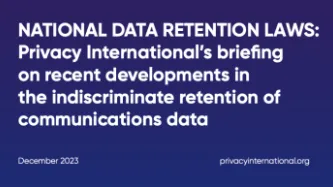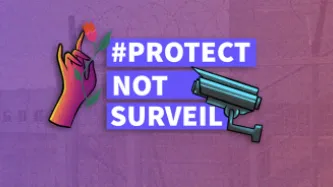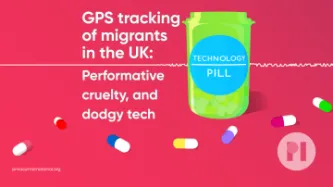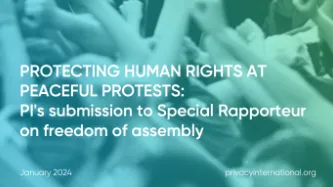Search
Content type: Advocacy
On 10 April 2024, the European Parliament adopted the New Pact on Migration and Asylum, a package of reforms expanding the criminalisation and digital surveillance of migrants.
Despite civil society organisationsʼ repeated warnings, the Pact “will normalise the arbitrary use of immigration detention, including for children and families, increase racial profiling, use ʻcrisisʼ procedures to enable pushbacks, and return individuals to so called ʻsafe third countriesʼ where they are at risk of…
Content type: Advocacy
Privacy International (PI) welcomes the opportunity to provide input to the forthcoming report the Special Rapporteur on contemporary forms of racism, racial discrimination, xenophobia and related tolerance to the 56th session of Human Rights Council which will examine and analyse the relationship between artificial intelligence (AI) and non-discrimination and racial equality, as well as other international human rights standards.AI applications are becoming a part of everyday life:…
Content type: Long Read
In 2023, Privacy International continued to produce real change in the world. We kept challenging governments and corporations that use data and technology to exploit us; pushed for new legislative standards; educated and campaigned with others.
And, we produced HUGE impact that directly affects each of us.
Here's a selection of our biggest achievements from last year.
WE CHALLENGED COMPANIES TO CHANGE THEIR BUSINESS MODELS AND PRACTICES
French Data Protection regulator (CNIL) fined Doctissimo…
Content type: Report
Over the past years, data retention regulation imposing generalised and indiscriminate data retention obligations to telecommunication companies and Internet service provides has been introduced in various jurisdictions across the world. As the data retention practices across the world have evolved this new report is an attempt to shed some light on the current state of affairs in data retention regulation across ten key jurisdictions. Privacy International has consulted with human…
Content type: Advocacy
In PI’s view the Revised Draft is a significant step back to the already weakened previous draft. Among the many concerns that we highlight in this analysis, we are particularly dismayed by the deletion of a principle on privacy, data protection and confidentiality in Article 3. In all previous drafts, the inclusion of such provision reflected the importance that data protection and privacy plays in any effective, modern public health policies. Failing to keep a specific principle on privacy…
Content type: Advocacy
Why the EU AI Act fails migration
The EU AI Act seeks to provide a regulatory framework for the development and use of the most ‘risky’ AI within the European Union. The legislation outlines prohibitions for ‘unacceptable’ uses of AI, and sets out a framework of technical, oversight and accountability requirements for ‘high-risk’ AI when deployed or placed on the EU market.
Whilst the AI Act takes positive steps in other areas, the legislation is weak and even enables dangerous systems in the…
Content type: Advocacy
Generative AI models are based on indiscriminate and potentially harmful data scrapingExisting and emergent practices of web-scraping for AI is rife with problems. We are not convinced it stands up to the scrutiny and standards expected by existing law. If the balance is got wrong here, then people stand to have their right to privacy further violated by new technologies.The approach taken by the ICO towards web scraping for generative AI models may therefore have important downstream…
Content type: Advocacy
Privacy International has joined several UK civil society organisations from across sectors in expressing our deep concerns regarding the financial surveillance powers proposed in the UK Data Protection and Digital Information Bill (DPDI Bill). Specifically outlined in Clause 128 and Schedule 11, these measures introduce mass algorithmic surveillance aimed at scrutinizing bank and third-party accounts to purportedly detect welfare fraud and errors. In other words, the Department for Work…
Content type: News & Analysis
In a significant and forceful decision, on 1 March 2024 the UK's Data Protection Authority found that the UK Government's GPS tagging of migrants arriving to the UK by small boats and other "irregular" routes was unlawful.
The decision comes as a result of Privacy International's complaint filed in August 2022 against the GPS tagging policy, which alleged widespread and significant breaches of privacy and data protection law. Our complaint relied extensively on anonymous testimonies of…
Content type: Key Resources
We have been tracking the use of EdTech around the world to better understand the trends and shortcomings and strengthen ours and others understanding regarding these issues.This page will be updated as we find more examples and stories about EdTech from all around the world.
Content type: Examples
Some UK schools have bought and installed sensors in toilets that 'actively listen' to pupils' conversations to try to detect keywords spoken by pupils. The sensors are being sold to detect vaping, bullying, and other problems. However, privacy campaigners say these sensors are potentially a safeguarding issue, a violation of children's rights, and are likely to be unlawful. The sensors do not record or save any conversations, but send alerts to staff when triggered. Not all the schools…
Content type: Video
We explore the legal case, the ways the tag hasn't worked for long periods of time, and a dubious AI the Home Office has been using in decisions as to whether someone remains on a GPS tag.LinksRead more from Katie's law firm, Wilsons Solicitors, about the casePI's Complaint to the ICO (the UK's Data Protection Authority)Read more about relevant cases in which PI has filed witness evidenceThe five companies at the heart of the UK's GPS tagging systemWe tested GPS ankle tags, read how our…
Content type: Advocacy
Privacy International welcomed the opportunity to provide input to the study of the UN Human Rights Council Advisory Committee on the human rights implications of new and emerging technologies in the military domain (NTMD) to be presented to the Human Rights Council at its sixtieth session.In the course of our work, we observe that the line between military and civilian technologies is blurring. Governments are increasingly relying on the very same technologies for military and civilian uses.…
Content type: Examples
Google is working to extend the lifespan of Chromebooks by providing software updates for up to a decade. The new policy, which will begin in 2024, will ensure that no current Chromebook expires in the next two years. The expiration dates were proving expensive for schools, which were having to spend millions of dollars on replacements because unsupported Chromebooks can't be used for mandatory state testing. Article: Google extends life of ChromebooksPublication: Wall Street JournalWriter…
Content type: Advocacy
Privacy International (PI), Big Brother Watch (BBW), StopWatch, CopWatch, Defend Digital Me, Liberty and Statewatch have written to Home Secretary James Cleverly to raise concerns over the danger posed to UK society by Facial Recognition Technology (FRT).In a letter sent on 18 January 2024, the signatories raised concerns over the escalating use of FRT and warned the Home Secretary that "The indiscriminate use of this dystopian biometric technology to identify people in public spaces is a form…
Content type: People
Sana is an Advocacy Officer at Privacy International where she works on the strategic areas ‘Demanding State Accountability’ and ‘Dignity’. Before joining PI, Sana led the Policy and Advocacy team at Justice Project Pakistan, where she engaged in domestic and international advocacy to reform the criminal justice system in areas including the death penalty, prison reform, torture, and consular protection. In the past, she has led the litigation team at Justice Project Pakistan, supported…
Content type: Advocacy
Privacy International's response to the call of submissions of the UN Special Rapporteur on the rights to freedom of peaceful assembly and of association on the tools and guidelines which may assist law enforcement in promoting and protecting human rights in the context of peaceful protests. The Special Rapporteur's report will be presented at the 55th session of the UN Human Rights Council.While PI recognises the role of law enforcement can play in facilitating the enjoyment of freedom of…
Content type: Examples
Data-driven wellbeing audits are becoming common in classrooms in Denmark, which has long invested heavily in digital teaching aids and interactive learning. In the last few decades, depression among Danish children has sextupled, and a quarter of ninth-graders report having attempted self-harm. Platforms such as Woof offer teachers regular feedback based on anonymous self-reports. Similar systems in the US extend to surveilling students' emails, chat, and searches.Experts are concerned that…
Content type: Examples
The facial recognition system the Indian state of Telangana intends to adopt for taking attendance in schools will be AI-enhanced, eliminate the paper register via an Android app, serve 2.6 million students in 26,000 schools, and be extended to teachers after it has been successfully implemented for students. The system will capture a secured binary template based on 72 points on the face rather than photos of end users.Article: Telengana facial recognition system will include…
Content type: Examples
Following pilots in Nirmal and Jayashankar Bhupalpally districts, the government of the Indian state of Telangana is planning on adopting facial recognition software to manage attendance in the schools. Officials have said the system should ensure every transaction is transparent and traceable and work in all environments with low-configuration mobiles and tablets. The existing biometric system has had technical issues.Article: Telangana adopts facial recognition for taking…
Content type: Examples
Since launching its The Learning App in 2015, the Indian EdTech company Byju's had grown to serve more than 80 million users and 5.5 million paid subscribers by 2021; it provides learning programs for students aged four years old and up. However, former employees say that underpinning the company's growth is a hard-selling culture that takes advantage of underprivileged families who can't afford their products but in India's hyper-competitive environment take out loans they can't afford to…
Content type: Examples
The Nigerian startup uLesson, which began by offering pre-recorded lessons on dongles, now delivers livestreamed interactive video classes to learners in a number of African countries as well as the US and UK. One of uLesson's investors is Tencent, which also backed at least three Chinese EdTech companies between 2018 and 2021 before China began requiring companies teaching compulsory primary and middle school subjects in China to register as "nonprofit institutions".Article: Chinese-backed…
Content type: Examples
Under a five-year $20.7 million contract, the US state of Utah is allowing the AI company Banjo real time access to numerous sources of state-owned camera and location data, among other types and combine it with information collected from social media, satellites, and other apps in order to use its algorithms to detect "anomalies" and alert law enforcement to crimes as they take place. Banjo claims to be able to do this while stripping personal information from its "Live Time Intelligence"…
Content type: Examples
The Greek defence startup Lambda Automata is putting up "Outpost" autonomous observation towers to enhance monitoring of the country's numerous islands in the Aegean Sea, important in territorial conflicts with Turkey. The towers use computer vision algorithms to turn CCTV cameras into situational awareness tools; they are solar-powered and can accommodate third-party sensors to expand their functions. https://greekcitytimes.com/2022/10/04/autonomous-greek-islands-threats-tec/…
Content type: Examples
Cellebrite, which provides technology to unlock phones and access their data, asks its government agency customers to keep both its technology and the fact that they used it secret, a leaked company training video shows. Such a request violates the rights of the public to expect that authorities are transparent when asking judges to authorise searches. In the video, the company employee claims that disclosure could hinder law enforcement and help criminals.https://techcrunch.com/2023/08/19/…
Content type: Examples
Sir John Sawers, the head of MI6 between 2009 and 2014, set up a meeting between Palantir CEO Alex Karp and the Cabinet Office permanent secretary, John Manzoni, in 2019; a year later the US-based company was awarded a £27 million contract to process border and customs data without competitive tender. Palantir's strategy appears to be to offer £1 contracts to provide services to gain a footing, and then raise prices once established. It has also hired former public servants and NHS executives.…
Content type: Examples
Republic Squiare, one of the cultural and social hubs of the Serbian capital, Belgrade, is under constant surveillance by equipment made by the Chinese company Huawei that recognises faces, identifies vehicle number plates, and judges whether activities are "suspicious". Despite controversy over the cameras, Belgrade plans to extend the network to 8,000 cameras as part of a "safe city" partnership with Huawei. Similar installations are taking place across the world, exporting China's values to…
Content type: Examples
When the Los Angeles Police Department opted to monitor the messages posted in forums on Neighbors, a companion app to Amazon's Ring doorbell cameras, the system forwarded over 13,000 messages in just over two years. Research shows, however, that this type of surveillance does a poor job of deterring property crime. A study of Neighbors posts in LA also shows that posters typically live in whiter, more affluent districts, and about 30% of posts did not describe criminal activity, just behaviour…
Content type: Examples
The UK Home Office has drawn up secret plans to draft a letter lobbying the Information Commissioner's Office to allow the privately held company Facewatch's matching service to spread into retail shops and supermarkets across Britain in order to curb shoplifting. The strategy was agreed in a meeting between Facewatch, policing minister Chris Philip, and senior Home Office officials. It is not known what contact, if any, between the Home Office and the ICO followed the meeting.https://www.…
Content type: Examples
The UK's Home Office is expanding its contract with the Portuguese company Tekever, which has supplied live-streamed drone footage captured by a combination of radar, video, and infrafred imagery through a £1 billion contract since 2020; this contract is now being extended to monitor large stretches of the English Channel in new ways. The UK is just one of many countries that see drones as a "game-changer" in patrolling borders and trapping human smugglers. The global drone market is expected…














